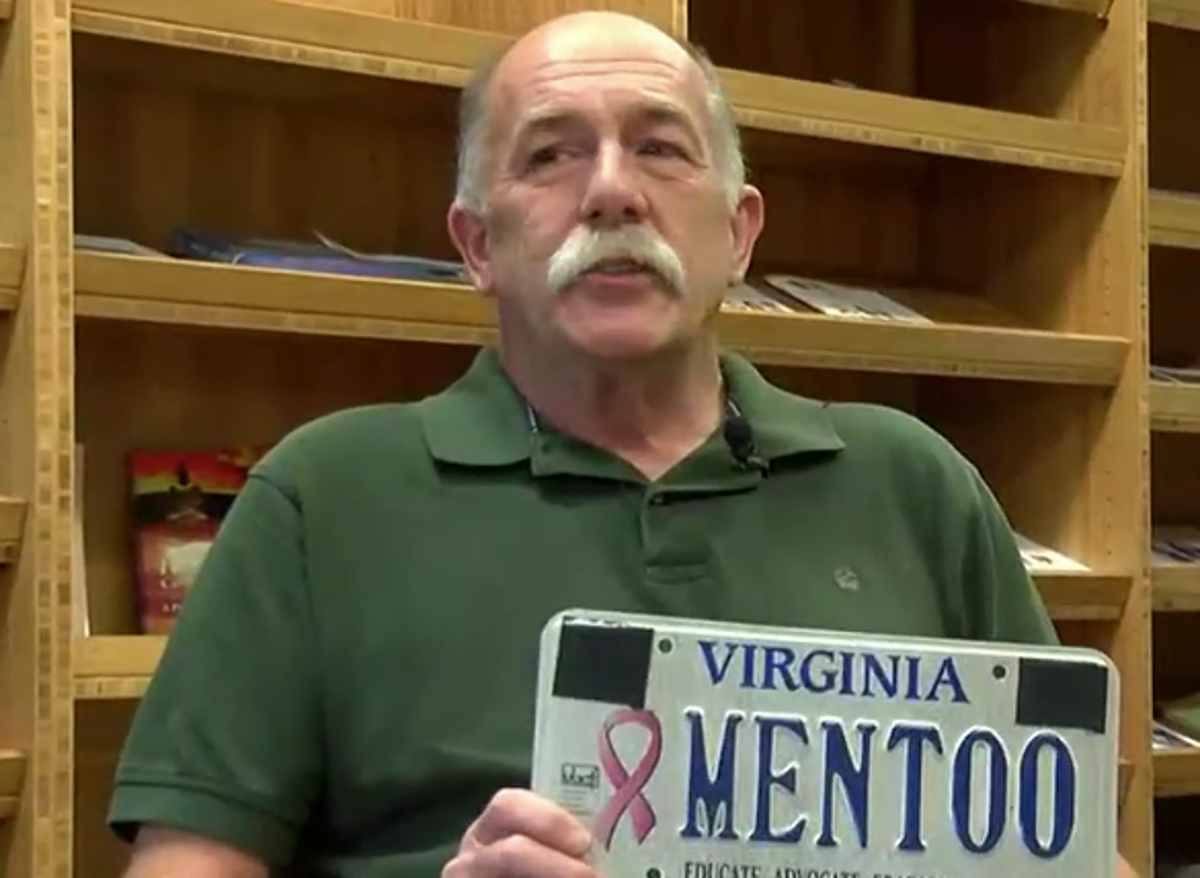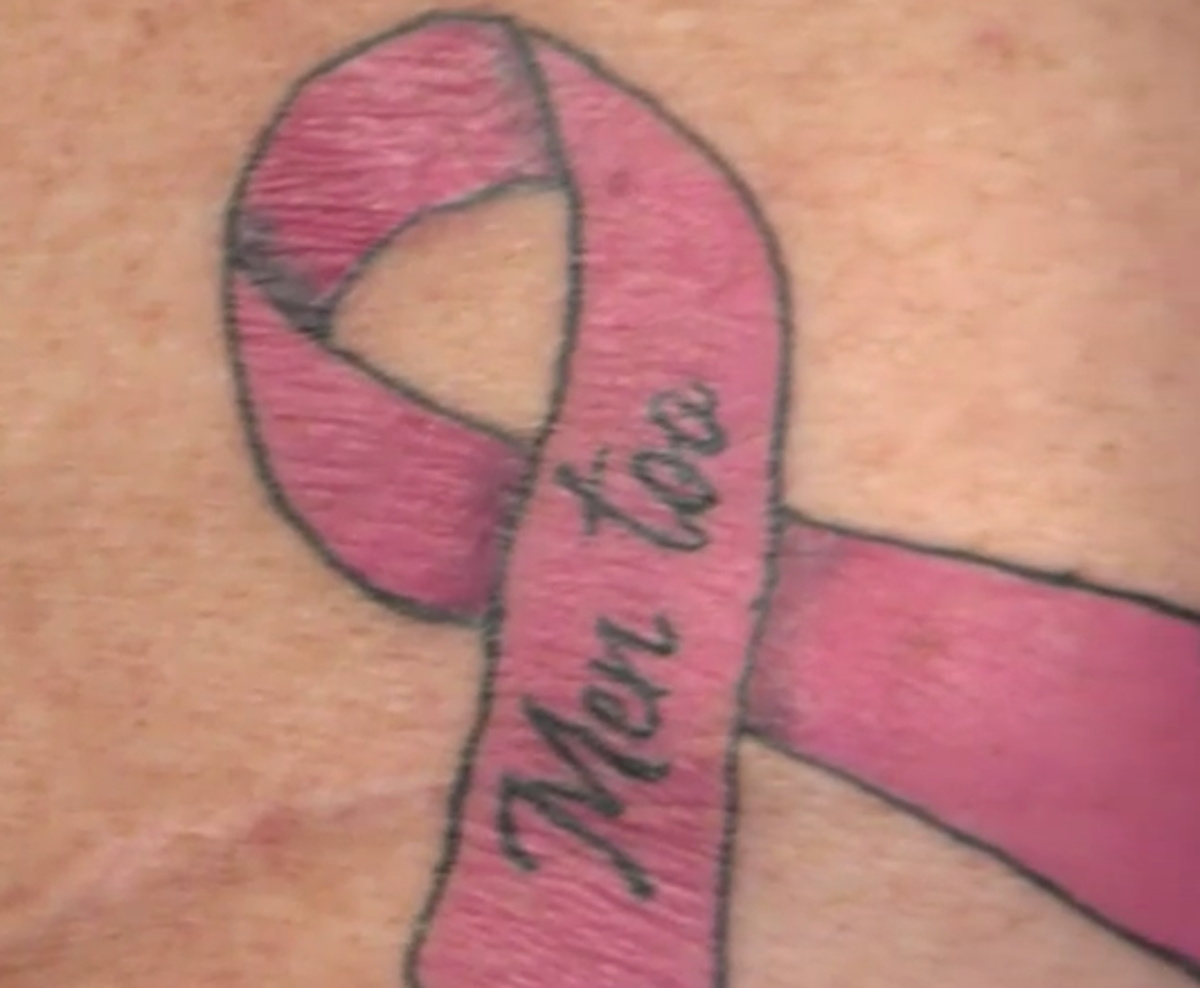Moving Past 'Embarrassment'
- David Shelton, 67, has opened up about battling breast cancer twice and the “embarrassment” he felt when he was first diagnosed with the disease in 2010.
- In his efforts to spread male breast cancer awareness and change the way men view the disease, the 67-year-old made himself a license plate with the saying “Men Too.” He also tattooed those same words inside a pink ribbon on his body.
- Treatment for male breast cancer is largely the same as female breast cancer. A person's options depend greatly on a variety of factors, including the size of the tumor and how far the cancer cells have spread, but possibilities include surgery, chemotherapy, hormone therapy, radiation therapy and targeted therapy.
In his efforts to spread male breast cancer awareness and change the way men view the disease, the 67-year-old made himself a license plate with the saying “Men Too” to commemorate beating breast cancer the first time. The second time he beat the disease, he got those same words tattooed on his body inside a pink ribbon.
Read More
Shelton’s cancer returned in October 2019 and infected his lymph node.
He recounted his second diagnosis being “a little bit scary,” admitting he thought it would “never come back.”
Thankfully, with the help of radiation, Sheldon beat cancer a second time and insists he’s “ready to battle it a third time” if the event arises.
To celebrate his second fight, he has had the words “Men Too” tattooed on his scarred chest.
"It says 'Men Too,'” he explained in his most recent interview. "It's my billboard, my mouthpiece!"

He said, "I want people to look at me and say, 'Oh, I wonder what happened to him?' But now they're going to look at me and say, 'Oh wow, that guy had breast cancer!’ That's what I want."
“I want to spread the word so it might save someone's father, or someone's son, or someone's nephew," he concluded. "Someone's life could get saved. Just by checking themselves out."
What Is Male Breast Cancer?
The lifetime risk of getting breast cancer is about 1 in 833 for men. In addition, the American Cancer Society estimates that about 2,710 new cases of invasive breast cancer will be diagnosed in men in the United States in 2022.
The Shock and Awe of Hearing You Have Breast Cancer Men Need to Know About Risks
There are several risk factors that can increase a man's chance of developing the disease, just like in the case of female breast cancer. If you're a man with any, all or some of the following risk factors, vigilance is key.
Possible Risk Factors for Male Breast Cancer:
- Age. Breast cancer risk increases with age, and most cancers are found in patients over 50. The average age of a man diagnosed with breast cancer is 72.
- Family history. Men with close blood relatives who have had breast cancer are at higher risk for the disease.
- Genetic mutations. Patients may inherit gene defects that make them more susceptible to breast cancer. Men with a mutation in the
BRCA2 gene have a 6 percent lifetime risk of developing breast cancer, and men with a mutation in the BRCA1 gene have a 1 percent lifetime risk. These gene mutations are most commonly found in families with strong histories of breast or ovarian cancer, but they have also been found in male breast cancer patients without a family history. - Klinefelter syndrome. Men with Klinefelter syndrome are born with at least one extra X chromosome which may increase a man's breast cancer risk by producing high levels of estrogen (a hormone responsible for female sex characteristics) and low levels of androgens (hormones responsible for male sex characteristics). This condition affects about 1 in 1,000 men, and can raise the risk of breast cancer by 20 60 times that of the general population.
- Hormone therapy. Men who have been treated with drugs containing estrogen are at a greater breast cancer risk. These drugs were once used to treat prostate cancer, and they are still used in sex reassignment processes.
- Conditions affecting the testicles. Testicle injuries, swelling or removal surgery can increase a man's risk for the disease by disrupting normal hormone levels.
- Liver disease. Diseases that impede the liver (like cirrhosis) may raise men's estrogen production and lower their androgen levels, therefore, increasing breast cancer risk.
- Alcohol. Heavy drinking is known to raise the risk of breast cancer (which may be related to alcohol's effect on the liver).
- Radiation therapy. Men who have received radiation therapy to their chests (for conditions like lymphoma) have a higher risk of developing breast cancer.
- Obesity. Fat cells can transform androgens into estrogens, boosting the possibility of an overweight man developing breast cancer.
If any of the above risk factors applies to you, consult your doctor and feel free to ask questions. While it's true that men can work to lower their breast cancer risk by exercising and maintaining a healthy bodyweight, the most important element of effective cancer treatment is an early diagnosis.
Symptoms of Male Breast Cancer Can Include:
- A lump developed in the breast (usually painless), or a thickening in the breast tissue
- Nipple pain
- An inverted nipple
- Discharge from the nipple, which may be clear or bloody (this was Mathew Knowles' first symptom)
- Changes to the color or texture of the nipple and areola
- Changes to the color or texture of skin on the chest
- Enlarged lymph nodes under the arm
Treatment for male breast cancer is largely the same as female breast cancer. A person's options depend greatly on a variety of factors, including the size of the tumor and how far the cancer cells have spread, but possibilities include surgery, chemotherapy, hormone therapy, radiation therapy and targeted therapy.
There is Nothing to Be Ashamed of with Male Breast Cancer
Marc Futterweit is a two-time breast cancer survivor … and he knows first-hand that the shame that comes with a diagnosis of male breast cancer can be quite debilitating. The urge to just ignore the symptoms and tell yourself breast cancer is a woman's disease may sway you from getting screened. But Futterweit has become an advocate for the disease, and is now dedicated to halting that way of thinking.
If You Feel Something, Say Something Men Ignore Symptoms Too Often
"Men are basically standing in the shadows,” Futterweit previously told SurvivorNet. “They're ashamed or embarrassed … this is a woman's disease. [But] why can't men get breast cancer?"
A lot of people assume men can't even get breast cancer because they don't have breasts, but that's not the case. The American Cancer Society estimates that about 2,550 men will be diagnosed with breast cancer every year in the United States, and 480 men will die from it. It's much less common in men than it is in women (the lifetime risk of a man getting breast cancer is about 1 in 833), but surveillance and screening is still important.
That's why Futterweit's philosophy is "if you feel something, say something." He detected his own cancer when he felt an odd lump on his chest during a shower. He admits, he was baffled when his doctor suggested he get a mammogram, but in reality, it probably saved his life.
"The problem with men is that they wait, and they think things are going to go away," Futterweit says. "Once they're diagnosed, sometimes it's too late."
Contributing: SurvivorNet Staff
Learn more about SurvivorNet's rigorous medical review process.

